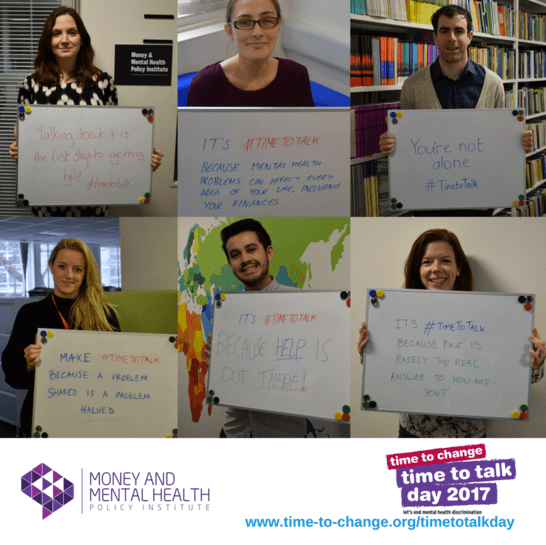
Make #TimeToTalk today
There aren’t that many taboos left in our society. But the ones that are left? They still cause huge harm, by stopping people having the conversations they need to have.
I’m thinking about mental health problems – admitting your feelings, talking about how hard it is to get through the day. And money worries, too. Much easier to brush them under the carpet and not admit to anyone that you’re struggling. It’s like admitting weakness to tell someone you need help.
Well, on Time to Talk day, it’s time to change that – time to break both of those taboos. Time to Talk Day is part of the anti-stigma Time to Change campaign, that’s working to make sure everyone feels able to talk about their mental health, ask for help, and admit when things have got too tough.
This year, I think we need to start talking about an aspect of mental health that we still tend to hide: how we feel about money. People in financial difficulty are twice as likely to develop major depression as those without. Money worries are consistently rated as one of the top strains on relationships. It’s a huge issue that affects our mental health every day – it’s Time To Talk about it.
The cost of silence
The costs of debt and financial difficulties can be enormous, but the cost of the silence that surround them can be just as devastating. By staying silent or hiding the extent of financial difficulties, people are putting immense strain on themselves and on their relationships with those around them. We’ve heard from many people who don’t discuss the household finances with their partner at all, hide bills or throw away bank statements unopened.
“My partner nearly left me and even now doesn’t know the full truth [about my financial difficulties].”
This silence can harm relationships, but it can also worsen people’s mental health and impede recovery. This makes it all the more worrying that our research found 88% of people with mental health problems who said they are also in financial difficulty had not told their doctor, despite saying their financial situation made their mental health worse.
“[I was] scared, didn’t want to admit there was a problem even though there was.”
Shameful stereotypes
One of the most common reasons people gave for not bringing up financial difficulties when talking with a doctor about their mental health was shame and embarrassment .
This captures well the societal image people often have of someone in debt; an impulsive, irresponsible or disorganised person, unable to manage a budget or resist a purchase. And so to fall into debt risks being viewed by society as someone who fits into this crude stereotype.
“I was ashamed. I didn’t want more people knowing what a failure I was.”
In reality a sudden life event can often be the trigger for the onset of these difficulties, be it a redundancy, a relationship breakdown or the onset of a mental health problem that makes it impossible to work. It could also be a mental health problem that makes it much more difficult to deal with paying bills or communicating with banks, or harder to resist spending even at times when people might be at risk of financial difficulty.
We need to do away with this inaccurate and harmful stereotype, to make sure people can begin to be more open about their financial difficulties – and get the support they need.
Are things getting better?
While the conversations around mental health may be growing and breaking down stigma, the same can’t be said for debt stigma. A report from Mind in 2011 found that almost two thirds of people didn’t tell their doctor about their financial difficulties as they don’t like talking about finances. Our research found that in the five years since, this figure hasn’t changed.
Mental health is something we haven’t been good at talking about for generations, but even just in the last five years we’ve seen the conversations grow; in workplaces, communities and in the media. All of which has worked to encourage more people to seek help for mental health problems when they need it.
But talking about the way we feel about our money, and seeking help for financial difficulty, is still lagging behind.
Starting the conversation
Changing stereotypes and breaking down stigma takes time. But there’s still much that can be done right now to ensure those in difficulty receive support. For example, we believe that proactively asking about people’s finances (rather than waiting for the information to be volunteered) would enable doctors to signpost people to the right support, boosting recovery rates. Whether with friends, colleagues or healthcare professionals, it’s clear that this is a conversation that needs to be started.
The Money and Mental Health team shared why it’s important to talk today, below you can see their thoughts:

Find out more about Time to Talk Day
